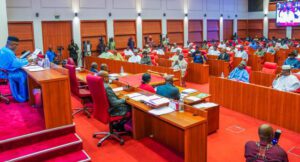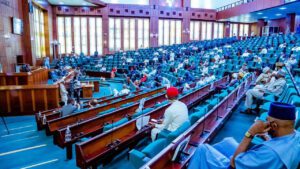
Debt profile: Cardoso preaches transparency, interagency collaboration to foster investors’ confidence
The Governor of the Central Bank of Nigeria (CBN), Mr. Olayemi Cardoso has preached transparency, interagency collaboration to foster investor’s confidence in the country.
Cardoso made this known while making comments on Nigeria’s debt management.
The CBN Governor advocated for constant declaration of the nation’s ABPs and debt portfolios as part of deliberate efforts to making the sub-sector transparent.
He said, “Moreover, it is vital to make the disclosure of our debt portfolios and borrowing activities routine. This transparency builds trust with investors, creditors, and the public, creating a virtuous cycle that reduces borrowing costs and promotes efficient debt management.
“Developing and implementing a robust Annual Borrowing Plan (ABP) offers numerous benefits. A well-articulated ABP communicates the government’s borrowing intentions to domestic and international markets enhancing predictability and fostering investor confidence. This, in turn, attracts a broader pool of investors and can lead to more favorable borrowing terms.
“Additionally, the ABP facilitates proactive risk management by identifying potential vulnerabilities, such as refinancing risks or exposure to specific currencies or interest rate movements, allowing debt managers to take preemptive measures to mitigate these risks.”
Speaking on the importance of collaboration, Cardoso noted that a collaboration would ensure proper coordination with a view to seeing that borrowings fit into the nation’s macro-economic framework and objectives.
The Governor who was represented by the Ag. Director of Policy of the CBN, Dr. Ladi Bala-Keffi, at the Regional Workshop on ABP Development, in Abuja, said that inter-agency synergy was key to efficient borrowing by the government.
His words: “The development of the ABP requires close collaboration among various stakeholders, including the Ministry of Finance, the Central Bank, and debt management agencies.
“This collaborative process strengthens coordination, enhances coherent decision-making, and avoids ad hoc borrowing operations, ensuring that borrowing activities align with broader macroeconomic objectives.
“Furthermore, the ABP promotes responsible debt management practices by aligning borrowing activities with the Medium-Term Debt Strategy (MTDS) and fiscal policies. This alignment contributes to long-term debt Sustainability, reducing the likelihood of debt distress and its adverse economic consequences.”
Speaking further, Cardoso said that no government agency in any country could develop strategies for ABP and Debt Management Strategies without involving others.
“Formulating robust Debt Management Strategies (DMS) and Annual Borrowing Plans (ABP) cannot be done in isolation.
“It requires a comprehensive approach involving a well-coordinated institutional framework for public debt management and a stable macroeconomic environment.
“Strengthening the budgetary process and accounting systems to enhance transparency and accountability is also essential,” he said.
In his address, the Director-General of WAIFEM, Dr. Baba Musa said that the workshop was a milestone to WAIFEM,
In recognition of the critical importance of Annual Borrowing Plan (ABP) development to member countries.
He said, “We proudly offer this course as a stand-alone for the first time. The usual practice has been to embed it in the broader medium-term debt strategies (MTDS) training.
“Still, we believe that a dedicated focus will allow us to explore the complexities and nuances of (ABP) Development better, further enhancing Our debt managers’ expertise in the use of ABP Analytical Tool.”
The D-G noted that public debt has recently surged worldwide due to various factors, notably the COVID-19 pandemic, geopolitical tensions, and other economic shocks.
“This trend,” he said, “is mirrored in our sub-region, where debt managers grapple with unique challenges, including volatile commodity prices, elevated debt levels, limited fiscal space, fluctuating exchange rates, and rising borrowing costs.”
“These challenges pose significant threats to debt sustainability, macroeconomic stability, growth prospects, and, ultimately, the well-being of the citizens. In this context, sound public debt management strategies and well-articulated borrowing plans are more critical than ever.
“While our member countries diligently formulate and update Medium-Term Debt Strategies (MTDS), the practical implementation often presents considerable challenges.”
According to the WAIFEM boss, the one-week training would provide a holistic understanding of the role of ABP in public debt management; examine the foundational requirements for effective ABP development, particularly the need for robust data, institutional collaboration, and sound analytical frameworks.




